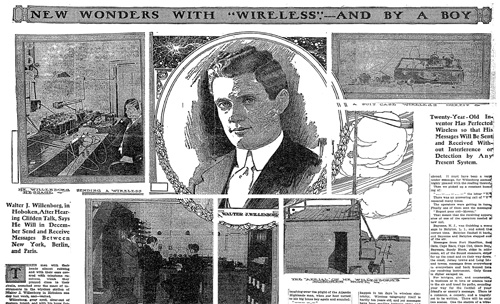There are real risks in reading the present moment into historical accounts, but I couldn’t help doing just that as I read “The Amateur Operators” by Susan Douglas (one of this week’s recommended readings for Henry Jenkins’ class, Fandom, Participatory Culture, and Web 2.0).
For those who haven’t read the piece, the gist of it is that the period of 1906-1912 saw an explosion in amateur wireless telegraphy, with boys and young men across an increasingly urbanized America “[reclaiming] a sense of mastery, indeed masculinity itself, through the control of technology.” (191) Wireless kits and how-to guides (some published by the “founder of science fiction” himself, Hugo Gernsback) sold like hotcakes, and in just a few years there were several hundred thousand amateur wireless operators spread out across the country.
This hobbyist culture, at once intensely social — as it inherently involved communication — and potentially isolating — as it required technical skills that could only be acquired outside of the flow of ordinary life — bears a striking resemblence to the tinkering subcultures that have attended the rise of home computing, network culture, and social media. Like the initial “boy wonder” practitioners of homebrew wireless telegraphy, early adopters of computational and network technology have initially been characterized in the popular discourse as heroes of the arcane, the possessors of secret knowledge, and even potential messiahs. But, as was the case with amateur radio operators, the culture has a tendency to swing in t he opposite direction as the technologies and practices in question become more widely embraced and therefore subject to greater scrutiny (and acts of mischief). In many cases this scrutiny has led to calls — rightly or wrongly — for regulation founded on anxieties about safety, morality, and legality (compare, for example, the heirarchically-minded US Navy’s half-pragmatic, half self-righteous outrage at the “leveling effect” of amateurs sharing the airwaves with professionals to academia’s worries over the loss of control over canon or the RIAA’s efforts to distinguish “professional” content from amateur production via vehicles such as tonight’s awkward and remarkably irrelevant Grammy awards ceremony).
Inspired by Douglas, I looked up the 1907 New York Times article that she references in her text, and found in it many parallels to early descriptions of Internet enthusiasts (among many other possible analogies — for example, such fascinated exaltations of the “boy-inventor” now can be found in press coverage of Augmented Reality designers, physical computing tinkerers, Y Combinator whiz kids or certain social networking platform CEOs). Have a look for yourself — the article is here. Then have a look at this gem from the Canadian Broadcasting Company, circa 1993:
Young Peter Mansbridge’s awkward yet strangely fascinating decision to not use the word “the” in front of “Internet” notwithstanding, a final parallel with wireless telegraphy occurs to me as I write these notes. According to Douglas’ account, the wireless boom peaked quickly and came to an end as the airwaves became so crowded as to be unusable. The US Navy, among others, fought and won a battle with the amateurs, despite the latter’s claims that “the ether was neither the rightful province of the military nor a resource a private firm could appropriate and monopolize,” and that “their enthusiasm and technical spadework entitled them to a sizable portion of the territory.” (214) In the end, none of these objections mattered: the airwaves were either militarized or sold off to corporate interests, and amateur radio was relegated to shortwave only (a limitation that caused an estimated 88% drop in the number of hobbyists in the United States). In light of this, could we consider the emergence of “boy inventor” and techno-messiah characters in popular culture as harbingers of public resource conflicts to come?
http://remotedevice.net/blog/the-amateur-operators-notes-on-early-adopters/



No comments:
Post a Comment